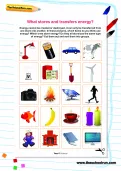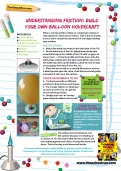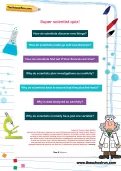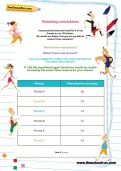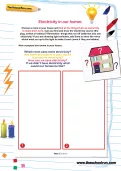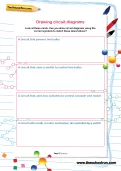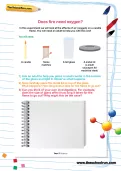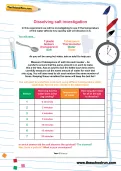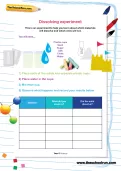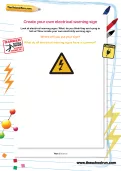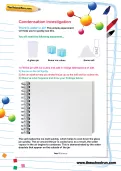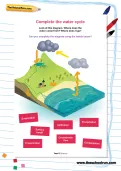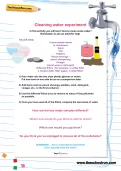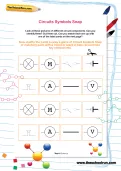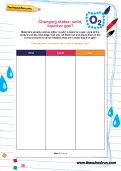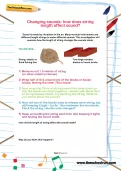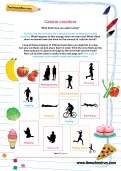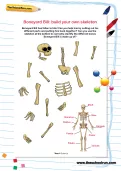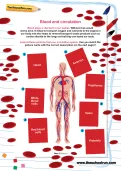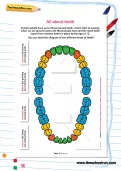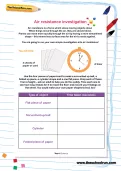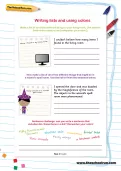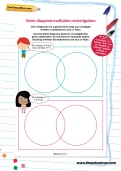Choose a room in your house and find all the things that use electricity to make them work. Can you find and draw the electricity source (the plug, switch or battery)? Remember: things that run off batteries also use electricity! If you are drawing light switches, add lines to show the wires which must run up to the light to make it work (even if they are hidden)
or
Register to add to your saved resources
Already a subscriber? to view this content.
Look at these cards. Can you draw circuit diagrams using the correct symbols to match these descriptions?
or
Register to add to your saved resources
Already a subscriber? to view this content.
In this experiment we will look at the effects of air (oxygen) on a candle flame. You will need an adult to help you with this one!
or
Register to add to your saved resources
Already a subscriber? to view this content.
In this experiment we will be investigating to see if the temperature of the water affects how quickly salt will dissolve in it.
or
Register to add to your saved resources
Already a subscriber? to view this content.
This is an experiment to help you learn about which materials will dissolve and which ones will not.
or
Register to add to your saved resources
Already a subscriber? to view this content.
Look at electrical warning signs. What do you think they are trying to tell us? Now create your own electricity warning sign.
or
Register to add to your saved resources
Already a subscriber? to view this content.
There is water in air! This simple experiment will help you to quickly see this.
or
Register to add to your saved resources
Already a subscriber? to view this content.
Look at this diagram. Where does the water come from? Where does it go? Can you complete the diagram using the labels below?
or
Register to add to your saved resources
Already a subscriber? to view this content.
In this activity you will learn how to clean some water!
or
Register to add to your saved resources
Look at these pictures of different circuit components. Can you identify them? Cut them out. Can you match each one up with one of the label cards on the next page? Now shuffle the cards to play a game of Circuit Symbols Snap or matching pairs with a friend or adult to help revise these key components.
or
Register to add to your saved resources
Already a subscriber? to view this content.
Materials usually exist as either a solid, a liquid or a gas. Look at the pictures on the next page. Can you cut them out and place them in the correct column to show whether they are a solid, liquid or gas?
or
Register to add to your saved resources
Already a subscriber? to view this content.
Sound is made by vibrations in the air. Many musical instruments use different length strings to make different sounds. This investigation will examine how the length of string changes the sounds made.
or
Register to add to your saved resources
Already a subscriber? to view this content.
Complete this investigation about changing liquids and solids and record your observations.
or
Register to add to your saved resources
Already a subscriber? to view this content.
Look at these pictures of different activities you might do in a day. Can you cut them out and place them in order from the ones that use the least amount of calories through to the ones that use the most?
or
Register to add to your saved resources
Already a subscriber? to view this content.
Boneyard Bill has fallen to bits! Can you help him by cutting out his different parts and putting him back together? Can you use the skeleton at the bottom to correctly identify the different bones Boneyard Bill is made up of?
or
Register to add to your saved resources
Already a subscriber? to view this content.
Look at these pictures from our circulation system. Can you match the picture cards with the correct description?
or
Register to add to your saved resources
Already a subscriber? to view this content.
Human adults have up to 32 permanent teeth, which start to emerge when we are about 6 years old. Most people have all their adult teeth (apart from wisdom teeth) in place by the age of 12. Can you label this diagram of the different kinds of teeth?
or
Register to add to your saved resources
Already a subscriber? to view this content.
Air resistance is a force which slows moving objects down. When things move through the air, they are slowed down. Planes can move more quickly through the air by having a more streamlined shape – this means less surface area for the air to resist against. Do you fancy having a go at running your own simple investigation into air resistance?
or
Register to add to your saved resources
Already a subscriber? to view this content.
Make a list of all of the different things in your living room. Use them to finish this sentence (and remember your colon!). Now make a list of all of the different things that might be in a wizard’s spell room. Use the list to finish the sentence below.
or
Register to add to your saved resources
Already a subscriber? to view this content.
Venn diagrams are a great tool to help you investigate whether a statement is true or false. Use the blank diagrams below to investigate the given statements. Give at least 10 examples before deciding whether the statements are true or false.
or
Register to add to your saved resources
Already a subscriber? to view this content.
